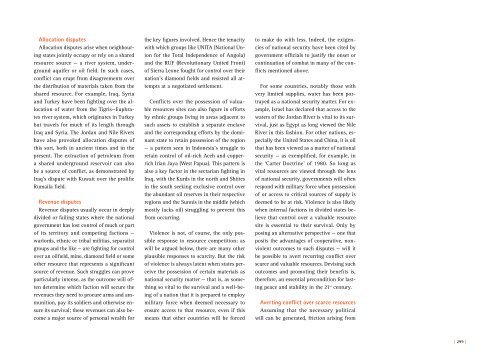RESOURCE COMPETITION IN THE 21ST CENTURY
RESOURCE COMPETITION IN THE 21ST CENTURY
RESOURCE COMPETITION IN THE 21ST CENTURY
Create successful ePaper yourself
Turn your PDF publications into a flip-book with our unique Google optimized e-Paper software.
Allocation disputesAllocation disputes arise when neighbouringstates jointly occupy or rely on a sharedresource source — a river system, undergroundaquifer or oil field. In such cases,conflict can erupt from disagreements overthe distribution of materials taken from theshared resource. For example, Iraq, Syriaand Turkey have been fighting over the allocationof water from the Tigris—Euphratesriver system, which originates in Turkeybut travels for much of its length throughIraq and Syria. The Jordan and Nile Rivershave also provoked allocation disputes ofthis sort, both in ancient times and in thepresent. The extraction of petroleum froma shared underground reservoir can alsobe a source of conflict, as demonstrated byIraq’s dispute with Kuwait over the prolificRumaila field.Revenue disputesRevenue disputes usually occur in deeplydivided or failing states where the nationalgovernment has lost control of much or partof its territory and competing factions —warlords, ethnic or tribal militias, separatistgroups and the like — are fighting for controlover an oilfield, mine, diamond field or someother resource that represents a significantsource of revenue. Such struggles can proveparticularly intense, as the outcome will oftendetermine which faction will secure therevenues they need to procure arms and ammunition,pay its soldiers and otherwise ensureits survival; these revenues can also becomea major source of personal wealth forthe key figures involved. Hence the tenacitywith which groups like UNITA (National Unionfor the Total Independence of Angola)and the RUF (Revolutionary United Front)of Sierra Leone fought for control over theirnation’s diamond fields and resisted all attemptsat a negotiated settlement.Conflicts over the possession of valuableresources sites can also figure in effortsby ethnic groups living in areas adjacent tosuch assets to establish a separate enclaveand the corresponding efforts by the dominantstate to retain possession of the region— a pattern seen in Indonesia’s struggle toretain control of oil-rich Aceh and copperrichIrian Jaya (West Papua). This pattern isalso a key factor in the sectarian fighting inIraq, with the Kurds in the north and Shiitesin the south seeking exclusive control overthe abundant oil reserves in their respectiveregions and the Sunnis in the middle (whichmostly lacks oil) struggling to prevent thisfrom occurring.Violence is not, of course, the only possibleresponse to resource competition: aswill be argued below, there are many otherplausible responses to scarcity. But the riskof violence is always latent when states perceivethe possession of certain materials asnational security matter — that is, as somethingso vital to the survival and a well-beingof a nation that it is prepared to employmilitary force when deemed necessary toensure access to that resource, even if thismeans that other countries will be forcedto make do with less. Indeed, the exigenciesof national security have been cited bygovernment officials to justify the onset orcontinuation of combat in many of the conflictsmentioned above.For some countries, notably those withvery limited supplies, water has been portrayedas a national security matter. For example,Israel has declared that access to thewaters of the Jordan River is vital to its survival,just as Egypt as long viewed the NileRiver in this fashion. For other nations, especiallythe United States and China, it is oilthat has been viewed as a matter of nationalsecurity — as exemplified, for example, inthe ‘Carter Doctrine’ of 1980. So long asvital resources are viewed through the lensof national security, governments will oftenrespond with military force when possessionof or access to critical sources of supply isdeemed to be at risk. Violence is also likelywhen internal factions in divided states believethat control over a valuable resourcesite is essential to their survival. Only byposing an alternative perspective — one thatposits the advantages of cooperative, nonviolentoutcomes to such disputes — will itbe possible to avert recurring conflict overscarce and valuable resources. Devising suchoutcomes and promoting their benefits is,therefore, an essential precondition for lastingpeace and stability in the 21 st century.Averting conflict over scarce resourcesAssuming that the necessary politicalwill can be generated, friction arising from[ 299 ]
















